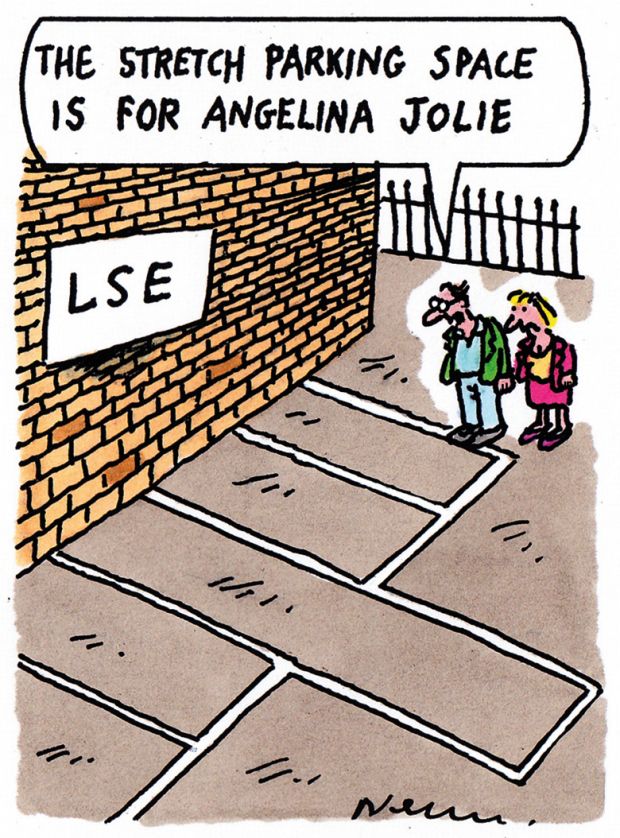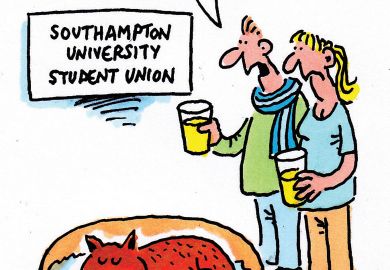
An unexpected collision between Hollywood and academia occurred last week after Angelina Jolie was named as a visiting professor at the London School of Economics. The Tomb Raider star will join the former foreign secretary William Hague as a “professor in practice” on a new master’s course on women, peace and security from autumn 2017, The Guardian reported on 23 May. “I am looking forward to teaching and to learning from the students, as well as to sharing my own experiences of working alongside governments and the United Nations,” said Jolie, a UN goodwill ambassador since 2001 who is now a special envoy. She urged other universities to consider creating similar courses on women’s right in conflict zones, which they surely would if they could entice Jolie or another A-list actress to teach them.
Being mistaken for the new girlfriend of a Hollywood film star does not happen to many academics. But TV historian Suzannah Lipscomb found herself in this unusual – and perhaps enviable – situation last week after she was photographed exiting London's Ivy Club with Tom Hiddleston, the Huffington Post reported on 26 May. Having been labelled the actor’s “mystery blonde" by The Sun, it soon emerged that Lipscomb, an academic at the New College of the Humanities, was simply leaving the club at the same time as the hot favourite to take over from Daniel Craig as James Bond. Fellow historians were quick to point out the error, with one suggesting that Lipscomb was not a “mystery blonde” so much as a “history blonde”.
Attempts to create a branch campus as far from anywhere as possible have not gone down well with a former vice-chancellor. Derec Llwyd Morgan, who ran Aberystwyth University from 1994 to 2004, said that it was “madness” that his former institution had set up on the Indian Ocean island of Mauritius, BBC News online reported. His comments were made after it emerged that just 40 students had enrolled at the campus in its first two terms. Aberystwyth said that the figures were comparable with the early phases of other branch campuses, but that did not convince Professor Morgan. “They would be better concentrating their resources on high-quality staffing and attracting more domestic students,” he said. The story broke in the same week that Middlesex University revealed that it was expanding its operations on the island. However, it says that it now has 1,000 students on the campus, a figure Aberystwyth will clearly be hoping it can emulate fairly quickly rather than going the way of the University of Wolverhampton’s Mauritius campus, which announced in December that it was closing.
When £9,000 fee loans came in, many commentators told students not to worry about the debt and higher interest rate as it would be written off after 30 years. Judging by a letter from one of the first graduates to actually experience what a Student Loans Company statement now looks like, that message has really reassured people. Simon Crowther’s letter to his local MP, which has gone viral on the internet, explains that he was under the impression that the government’s loans would be the “best…you could ever get – it was the cheapest money you could borrow”, not the 3.9 per cent interest rate he was actually being hit with on an already huge debt, The Guardian reported. “None of us really realised what we were signing up to,” he added, making a mockery of the previous government's attempts to pretend that student debt would not weigh heavily on graduates’ minds.
With just three weeks to go until maybe we can stop talking about the European Union and move on with our lives (fat chance), it has not gone unnoticed that universities are just ever so slightly coming down on one side of the argument. The Daily Telegraph went on the attack with an article on 26 May suggesting that institutions were flouting Charity Commission guidelines on neutrality over the referendum. The newspaper mentioned the strikingly partisan pro-EU statement from the University of Oxford’s governing council and pro-Remain emails sent to students at the universities of Exeter, Warwick and Wolverhampton among its examples of what pro-Brexit Tory minister Priti Patel branded an “anti-democratic abuse of power”. However, despite the points raised, it was notable that the only academic criticising universities in the article was Alan Sked, emeritus professor of international history at the London School of Economics, who founded the party that became Ukip.
Register to continue
Why register?
- Registration is free and only takes a moment
- Once registered, you can read 3 articles a month
- Sign up for our newsletter
Subscribe
Or subscribe for unlimited access to:
- Unlimited access to news, views, insights & reviews
- Digital editions
- Digital access to THE’s university and college rankings analysis
Already registered or a current subscriber?






